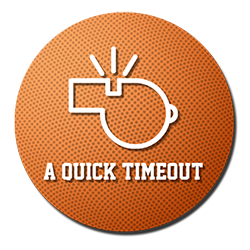*Originally posted on the FastModelSports.com Blog by Radius Athletics’ Randy Sherman.
Coaches: Is Choice-Supportive Bias plaguing your ability to make good decisions and move on from bad ones? Here’s how to spot and defeat it.
As coaches, we have all made decisions that we have come to regret. During preseason planning you may be excited about an offense, defense or lineup you have selected. You spend early season practices preparing your team to carry out the strategies you chose.
Then the season commences and you put those decisions in the marketplace. You begin to receive feedback and the immediate results are… not good. What you do at this moment could be influenced by a cognitive bias called Choice-Supportive Bias.
Do you stick with the decision? How long? Do you defend the decision? How vigorously? Do you downplay how poor the decision is beginning to look? What is holding you back from admitting the decision was bad? These are the questions that go into defeating Choice-Supportive Bias.
Choice-Supportive Bias in coaching
Choice-Supportive Bias is the tendency for a decision-maker to defend his/her own decision or to later rate it better than it was simply because he/she made it. When coaches defend a decision in the face of rising evidence that the decision was bad, that is Choice-Supportive Bias. When coaches exaggerate how good a decision was or downplay how bad it was, that is Choice-Supportive Bias.
The crux of this cognitive bias is what inhibits us from moving on. Why do we stick to a strategy that is not working? Why do we continue to give minutes to a player(s) that is proving to be ineffective? As coaches, we often tie our self-esteem to our decision-making ability. When a decision goes bad, it feels like a reflection on our judgement and intelligence – and no one likes to have either of those questioned. Admitting you were wrong is hard.
In efficient organizations there is no room for this, however. Protecting the ego of the decision-maker takes away from progress. Strong organizations pivot away from bad decisions before weak ones do.
Other examples
We coach in an age where data and performance quality measures are easier to obtain than ever before. Your decision feedback is often immediate and empirical. If you feel a decision “wasn’t that bad” you have tools in place to put that assertion to the test.
A real world example: we have all experienced buyer’s remorse. Perhaps you purchase an automobile, home or an expensive item like a set of golf clubs. You later begin to feel that you were the victim of some slick salesmanship and a seed of doubt about the decision begins to grow. You may have made an impulse buy you regret. What do you do? Typically we begin to justify the decision. We do all sorts of mental gymnastics and come up with talking points that make our decision sound like it was perfect. Those purchases too are decisions and when our decisions are tied to our self-esteem, Choice-Supportive Bias helps us “make it right.”
Coaches must take this a step further. Self-scout your team to evaluate whether the decisions you have made which seem to be working out favorably actually are.
How to identify and defeat
Coaching staffs should look at positive results with a bit of skepticism. It is easy to take positive results at face value and move on. Is our compact zone defense “working?” Or is it working because our opponents cannot shoot? What will become of it when we face an opponent who can?
It takes a trained coaching eye to discern whether a coaching decision goes wrong as a result of lack of skill or if it went wrong because it was a bad strategy. When building a basketball program, there is a certain amount of insistence a coach must exhibit. At times, the coach must be the most stubborn person in the room.
You will not win until you are good – but when our skill is where it needs to be and our effort level is where it needs to be and the strategy still goes wrong, it’s time to question its viability.
If you have overly defended a past decision just to protect your self-esteem or to save face, that is Choice-Supportive Bias. If you have tried to boost your self-esteem by exaggerating the value of a past decision, you are not only guilty of revisionist history but also Choice-Supportive Bias. Someone on staff needs the professional freedom to tell the decision-maker they are not being objective and their tendency to cling to decision a bit too long is damaging the progress of the program.
Continue the conversation:
For unbiased help with practice planning and examination of your process please reach out and join the Radius Athletics community for basketball coaches!
Any questions, contact Randy! Sign up here for a twice-monthly newsletter for basketball coaches!

